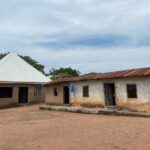by Bonface Orucho
From Accra to Dakar, Marrakech to Lagos, Nairobi and now, Cape Town, art residence programs are on the rise, often initiated by successful African artists and now also by public-private partnerships.
The French Ambassador to the southern African region, David Martinon, recently signed a letter of commitment with MEMORIST’s Director of Corporate Development, Sophie Taïeb, committing to supporting an African art residency in Cape Town.
“This is the first such residency we’re establishing in Africa, we’re very excited about the possibility of creating a modern, cultural experience within an historic environment,” he is quoted in the South African art news platform.
The Lenox, one of the oldest buildings in Cape Town dating back to as early as 1897, will be converted into “an upscale luxury 47-room boutique” that will also house artists’ residences.
“An entire floor of the hotel will be customized into a permanent art residence. This will draw talent from South Africa, the African continent and France and will provide a creative haven for up to nine artists annually,” according to Newmark Hotels and Reserves.
Art residencies typically bring artists of varying disciplines and practices together to live and work in a shared space and learn from each other.
Typically established in areas that can positively impact the creativity of the artists, the presence of an artist or group of artists can also be very good for the improvement of a neighborhood, as other creatives flock to the area—a global phenomenon that is widely recognized.
One novel study on the subject, published in Royal Society Open Science and called “Quantifying the link between art and property prices in urban neighborhoods,” used 4.4 million images geotagged on Flickr to show how the presence of an artist influences property prices (and, more controversially, gentrification) in a neighborhood over time.
The Lenox residency in Cape Town, set to open in 2026, is a collaborative project using a public-private partnership model. Memorist, a French company dealing in heritage conservation, restoration and digitization, will implement and manage the residency.
The building is close to the Iziko South African National Gallery, which will allow artists and guests to be more exposed to the vibrant cultural and artistic background of Cape Town.
Other art residences are popping up all over Africa.
Inaugurated in 2020, the Noldor Art Residency is an annual four- to six-week art residence program for contemporary artists from Africa or the African diaspora. Ghanaian artist, Joseph Awuah-Darko, known as Okuntakinte, is behind the residency program.
In Kenya, Kaloki Nyamai, a Kenyan contemporary painter and sculptor, set up the Kamene Art Residency in Nairobi in February 2023, alongside the country’s first art library. Nyamai successfully staged a solo exhibition in the US in 2022, featuring paintings worth more than US$290,000.
In Senegal, Nigerian-American artist, Kehinde Wiley set up a multidisciplinary artist residence program, Black Rock, in 2019, offering exclusive, unique art support and collaborations between African artists.
Apart from individual elite artists from the continent, there is a growing appeal among private sector investors and art enterprises to set up art residences, filling a gap in funding for a sector touted to hold considerable economic value.
Despite being below the radar of many investors or potential buyers, the sector’s market value was estimated at over US$1.8 billion last year, according to the Africa Wealth Report 2023.
According to the Museum of Modern Art, the demand for contemporary artworks from Africa or by African artists is constantly rising, underscoring the significance of more funding by the private sector into infrastructure and programs such as art houses and residence programs, and an increase in awareness, both locally and internationally.
Some private-sector-led investments are already bearing fruit. Morocco, for instance, has been witnessing a surge in artist residency programs spread across major cities, such as Marrakech and Rabat.
Some of the residences in the North African country include the Riad Jardin art residency in Marrakech, the Green Olive Arts Residency in Tetouan and the Cafe Tissardimine residency, among others.
According to Artnewsafrica.com, other top residences in Africa based on years of existence and frequency of intake include the ‘Forgotten Angle Theatre Collaborative’ in Mpumalanga, South Africa; the Queens Collective in Marrakech; Nafasi Art Space in Dar es Salaam, Tanzania; and the Tankwa Artscape in Karoo, South Africa.
Despite a slight decline recorded in auction sales by Christie’s, Sotheby’s and Phillips, at US$79.8 million in art sales in 2023, the sector experienced the second-highest sales ever recorded, according to ArtTactic, a London-based market analysis company.
bird story agency
Art residency programs are burgeoning across Africa, fueled by both successful African artists and public-private partnerships. A new significant initiative involves the French Ambassador to southern Africa, David Martinon, signing a commitment to support an art residency in Cape Town, in collaboration with Sophie Taïeb of MEMORIST. The Lenox, one of Cape Town's oldest buildings, will be transformed into a boutique hotel with a dedicated art residence floor, set to host up to nine artists annually from South Africa, Africa, and France.
Art residencies provide a space for artists to live, work, and collaborate, often revitalizing neighborhoods economically and culturally. A study published in Royal Society Open Science showcased the impact of artists on property prices and potential gentrification. The Cape Town project, scheduled to open in 2026, will be managed by Memorist, focusing on heritage conservation and featuring proximity to the Iziko South African National Gallery.
Other notable art residencies in Africa include the Noldor Art Residency in Ghana, Kamene Art Residency in Kenya, and Black Rock in Senegal, established by various acclaimed artists. There is a rising trend of private-sector investment in art residencies, with their market value estimated at over $1.8 billion in 2023. Despite a slight dip in auction sales, the sector remains robust, showing significant economic potential and growing demand for African contemporary art.
Art residencies have been flourishing across Morocco with programs like Riad Jardin, Green Olive Arts, and Cafe Tissardimine. Other top residences across Africa include the Forgotten Angle Theatre Collaborative in South Africa, Queens Collective in Marrakech, Nafasi Art Space in Tanzania, and Tankwa Artscape in South Africa.






